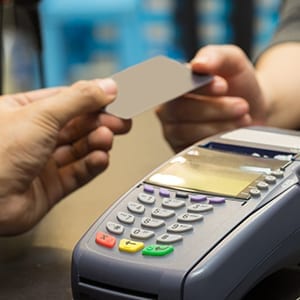
Today’s reality highlights the need for benefits debit cards. In a highly mobile, tech-driven society, card payments are the norm rather than the exception. Nearly everywhere, people can use their credit or debit cards as payment: at their doctor’s office, pharmacy, grocery store, retail shops, taxicabs, subway stations, and more. The speed, convenience and security of card payments are helping cards overtake traditional payment methods like cash and check.
When it comes to employer benefits packages, specifically with Flexible Spending Accounts (FSAs), Health Savings Accounts (HSAs), and Transit benefits, an account-linked benefits debit card makes sense. Not only does a benefits card help boost plan enrollment, it can also streamline the claims process by reducing the need for paper claims and waiting for reimbursement. Best of all, a benefits debit card can link to just about any tax-advantaged healthcare benefit account.
FSA Benefits Card
With an FSA benefits card, employees can use the card in-store and online to pay for IRS-approved medical-related expenses. Some retailers, such as Walgreens and FSAStore.com, clearly identify FSA-approved items. This makes it easy for card holders to know where their benefit dollars are going. And with enabled security measures such as the IIAS and MCC codes, restricted purchasing ensures they aren’t using their funds for non-approved expenses.
Since an FSA has the uniform coverage rule, FSA card holders can use their entire annual election at one time if they need it. They do not have to wait for the money to accrue. However, because FSAs often have a “use it or lose it” policy, any unused money cannot be used the following year (unless there is the $500 rollover).
For employees with a Dependent Care FSA, they can use the card for childcare expenses at their provider (where it’s accepted).
HSA Benefits Card
Like with FSAs, HSAs can also be linked to a debit card. With HSAs, anyone can fund the account and the debit card enhances the convenience of accessing HSA funds. A debit card for an HSA can be particularly useful for account holders enjoying rollover at years’ end, which helps grow their balance. Additionally, since the employee owns the account, offering an HSA debit card can increase enrollment and usage.
Eligible FSA/HSA Healthcare Expenses
The IRS publishes a list of eligible healthcare expenses. Common ways people use the card are for:
- Copays
- Deductibles
- Eye exams and eye wear
- Dental exams and treatments
- Prescription medications
Transit/Parking Benefits Card
Transit accounts are very popular in many major metros around the US. In fact, in some cities employers are required to offer a Transit option.
Employees with a Transit/Parking account can use their cards to pay for commuter expenses. Whether they’re buying bus or subway fare, or paying for parking at an automated machine, the card is super convenient. A card with terminal restrictions (which are required in several major metros), makes it easy for commuters to use their cards and receive spending authorization when used where only fare media is sold.
Keeping Receipts
One thing for employees to keep in mind is that they should always keep their receipts. They may be asked to submit that paperwork for purchase verification.
Consider offering a debit card to your employer-sponsored benefits package. The need for employees to have secure, convenient access to their benefit account dollars makes it a no-brainer.